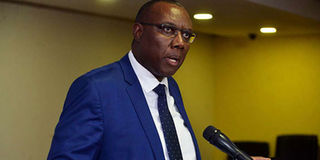Census should not turn into ethnic circus

Kenya National Bureau of Statistics Director-General Zachary Mwangi briefs editors on the outcome of the 2019 national census, at KICC on November 7, 2019. The report has been disputed. PHOTO | SALATON NJAU | NATION MEDIA GROUP
What you need to know:
- Even in politics, we must move beyond the primeval attraction of tribal numbers and start thinking about the things that actually determine whether we live or die.
The first set of analyses from the national census were released this past week, and predictably, every corner of this country erupted as though the world was coming to an end.
In a small segment of the country, politicians were caught celebrating that they have increased their numbers since the last census.
However, most of the reactions from across the country have been cries of disappointment that they were ‘under-counted’ for some malicious reason.
Indeed, there have been threats by some politicians that they would go to court to challenge the census report and demand the ‘raw data’ in order to verify whether the count is accurate.
While arguments have been made that the census is important for purposes of resource allocation and in guiding infrastructure design, a keen listener will hear only political noise from most of the complainants.
ETHNICITY
Our reactions to the census betray our national outlook. While the initial census report focused only on population numbers and density aggregated by gender, many commentators have been able to somehow tease out ethnic compositions and their political implications.
We are being told that the political wing affiliated to one or the other politician (meaning the tribal coalition thought to support him) ‘has made significant gains’ in the census, while another grouping has lost and therefore faces defeat in the forthcoming elections.
We are obsessed with a brand of politics guided by ethnicity to the exclusion of almost everything else.
It would have been understandable if we were arguing that inaccurate population numbers would result in poor distribution of important social amenities like schools, hospitals, security installations and infrastructure projects.
Unfortunately, these do not seem to make the cut in our arguments. Instead, we are fixated on our ethnopolitical muscle.
It should not be lost on observers that during the census the same politicians urged ‘their people’ to abandon their usual residence and go to their presumably rural ‘places of origin’ in order to boost their ethnic numbers.
IMPORTANT ISSUES
It is not clear how many Kenyans heeded the calls, but if a substantial number of them did, then obviously there will be distortions in our population distribution.
The result is that we shall be depriving the more ethnically heterogeneous, densely populated areas of this country, especially the more urbanised ones, of essential social services in favour of the sparsely populated more ethnically homogeneous areas.
Even political areas will be designated based on fake numbers, leading to complaints of low voter registration and turnout during elections.
It would appear that Kenyans have difficulty learning from past experience.
Even in politics, we must move beyond the primeval attraction of tribal numbers and start thinking about the things that actually determine whether we live or die, and how we live if we survive.
Prof Atwoli is Associate Professor of Psychiatry, Moi University School of Medicine. [email protected]





